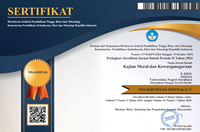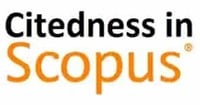MANIFESTATION OF ANTI-CORRUPTION ATTITUDES IN LEARNING BEHAVIOR IN STUDENTS OF THE FACULTY OF SOCIAL AND POLITICAL SCIENCES, STATE UNIVERSITY OF SURABAYA
DOI:
https://doi.org/10.26740/kmkn.v13n1.p72-80Keywords:
Anti-corruption attitude, Learning Behavior, Fisipol StudentsAbstract
This study aims to examine the manifestation of anti-corruption attitudes in the learning behavior of students of the Faculty of Social and Political Sciences (Fisipol) Surabaya State University (Unesa), using quantitative descriptive methods and the Gordon William Allport Attitude Component Theory approach, this study focuses on four main attitudes, namely honest, brave, caring, and responsible. The results of the study indicate that students' understanding of anti-corruption values is still low, with 99.1% of respondents having poor understanding and only 0.3% having sufficient understanding. From the affective variable, as many as 73.5% of students showed a positive attitude towards anti-corruption values in learning behavior. However, from the conative variable, only 25.4% of students actually apply these values in their academic behavior with the formulation of the problem how do Fisipol students understand anti-corruption attitudes, anti-corruption attitudes in Fisipol students in their learning behavior, the manifestation of anti-corruption attitudes of Fisipol Unesa students in their learning behavior, this study also found that there are gender differences in the tendency of corrupt behavior, where 88.2% of male students are indicated to have committed corrupt acts in learning, such as cheating and plagiarism, while only 29.4% of female students do the same. This finding indicates that the stereotype factor that develops in society, men are taught to be brave so that it can make men more reckless to commit corrupt behavior. This causes inconsistency between low cognitive, on the other hand affective attention to the rejection of corruption and high anti-corruption actions but not accompanied by low manifestations of anti-corruption actions. This is influenced by several factors including greed, opportunity and need.
Keywords : Anti-corruption attitude, Learning Behavior, Fisipol Students
Downloads
References
Bandura, A. (1986). Social foundations of thought and action: A social cognitive theory. Englewood Cliffs, NJ: Prentice-Hall
Bologna, J., Lindquist, R. J., & Wells, J. T. (1993). The Accountant's Handbook of Fraud and Commercial Crime. New York, NY: Wiley.
Burhanuddin, A. (2021). Pencegahan Korupsi Melalui Pendidikan Karakter: Kebijakan dan Praktik di Indonesia, Malaysia dan Singapura. Jurnal Pendidikan Karakter, 13, 133–149. https://doi.org/10.21831/jpka.v13i2.47782
Burhanuddin, A. A. (2021). Strategi Penanaman Nilai-Nilai bahwaAntikorupsi Pada Mahasiswa. Jurnal Studi Ilmu Keagamaan Islam, 2(2), hlm. 62.
Dewantara, J. A., Hermawan, Y., Yunus, D., Prasetiyo, W. H., Efriani, E., Arifiyanti, F., & Nurgiansah, T.
Dewantara, J. A., Sausan, DAN, Sari, I. F., Tanjungpura, U., Pontianak, K., & Barat, P. K. (2019). Efektivitas Pendidikan Antikorupsi Untuk Meminimalisir Tindak Pelanggaran Hak Asasi Manusia. Jurnal Kewarganegaraan, 6(2), 2727–2739.
Dynalaida, A. A., Febrianti, A., Jasmine, J., Napitupulu, M. T., & Tahir, M. S. (2022). Creativity of the Student Anti-Corruption Movement (Instilling 9 Anti-Corruption Values from an Early Age with Dokoro Elementary School Students). Journal of Creativity Student, 7(2), 155–178. https://doi.org/10.15294/jcs.v7i2.38198
H. (2021). Anti-Corruption Education as An Effort to Form Students With Character Humanist and Law-Compliant. Jurnal Civics: Media Kajian Kewarganegaraan, 18(1), 70–81. https://doi.org/10.21831/jc.v18i1.38432
Handayani, S. R., Sutiko, A. Y. W., & Pramita, R. A. (2022). Efektifitas Pendidikan Kecakapan Hidup Sehat (PKHS) Berfilosofi General Education Dalam Menumbuhkan Sikap antikoruptif. 10(2), 218–234.
Herdiansyah, H. (2016) Gender dalam perspektif psikologi. Jakarta: Salemba Humanika.
Ihsadan (2023). Pengantar Psikologi Sosial. In E. Damayanti (Ed.), Widina Media Utama. CV WIDINA MEDIA UTAMA.
Jasmin, M., Mailizar, M., Johar, R., & Ramli, M. (2022). Exploration of factors affecting changes in student learning behavior: A systematic literature review. International Journal of Evaluation and Research in Education (IJERE), 12, 1315. https://doi.org/10.11591/ijere.v12i3.24601
JURNAL INDRIA (Jurnal Ilmiah Pendidikan Prasekolah Dan Sekolah Awal, 01(01), 10–18.
Lestyowati. (2020). Integritas dan Antikorupsi. Media Syari Ah, 2, 155–156. https://doi.org/10.22373/jms.v%vi%i.7385
Melati, D. S. (2020) Hubungan Greed, Opportunity, Need, dan Exposure dengan Tingkat Kecurangan Akademik Siswa (Studi Empiris pada Siswa Kompetensi Keahlian Akuntansi dan Keuangan Lembaga SMK Negeri 3 Surakarta). Surakarta: Universitas Sebelas Maret.
Munawwirah, Z., & Amiruddidan (2023). Strategi Pendidikan Anti-Korupsi : Membangun Integritas dan Karakter Kejujuran Mahasiswa di Era Moderdan Jurnal Seumubeuet : Jurnal Pendidikan Islam, 2(2), 120.
Novriadi, D., & Montessori, M. (2021). Pemahaman Mahasiswa PPKn Fakultas Ilmu Sosial Universitas Negeri Padang Tentang Nilai-Nilai Antikorupsi. Jurnal Ideologi Dan Konstitusi, 1(1), 26–33.
Nurcahyono, O. H., Sarwastuti, A. P., & Rahman, A. (2021). Praktik Pendidikan Moral Emile Durkheim Dalam Komunitas Solo Mengajar. Sosio-Didaktika: Social Science Education Journal, 7(2), 311–335. https://doi.org/10.15408/sd.v7i2.17441
Pritaningtias, D. W., Barendriyas, A. S., Sabela, A. R., & Utari, I. S. (2019). Implementation of Anti- Corruption Education Through Penetrasi Method (Penanaman 9 Nilai Karakter Antikorupsi) for the Urban Village Community of Jabungadan Indonesian Journal of Advocacy and Legal Services, 1(1), 45–64. https://doi.org/10.15294/ijals.v1i1.33752
Ratnawati, E., & Nuraeni, S. (2021). Dongeng sebagai Pendidikan Antikorupsi pada Anak Usia Dini.
Rosikah, C. D., & Listianingsih, D. M. (2024). Pendidikan antikorupsi: KajianANTIKORUPTIFTeori dan Praktik. Sinar Grafika. https://books.google.co.id/books?id=BRRsEAAAQBAJ
Saputra, E., Dahlan, D., Kurniawansyah, E., & Zubair, M. (2023). Upaya Guru PPKn dalam Mengatasi Kenakalan Siswa di SMPN 5 Mataram. Jurnal Ilmiah Profesi Pendidikan, 8(1b), 523–531. https://doi.org/10.29303/jipp.v8i1b.1234
Suyadi, R., Ulfah, M., Azani, M. Z., Makhful, & Kardi, J. (2023). Model Insersi Pendidikan antikorupsi Dalam Pembelajaran Keagamaan Islam di SMK Pusat Keunggulan (SMK-PK). Edukasi Islami: Jurnal Pendidikan Islam, 12(04), 2673–2688. https://doi.org/10.30868/ei.v12i04.5131
Suyatmiko, W. H. (2021). Memaknai Turunnya Skor Indeks Persepsi Korupsi Indonesia Tahun 2020.
Wahyuningtyas, A. (2024, January). Tingkat Kognitif Tingkat Kognitif Mahasiswa Manajemen 23A2 Universitas Duta Bangsa Tentang Korupsi: Tingkat Kognitif Tentang Korupsi. In Prosiding Seminar Nasional Ilmu Politik, Bisnis, Sains dan Teknologi (Vol. 4, No. 1).
Wardiana, W. (2022). Ambiguitas Norma Pendidikan antikorupsi di Perguruan Tinggi, Antara Kewajiban dan Kebutuhadan Peradaban Journal of Law and Society, 2(1), 62–77. https://doi.org/10.59001/pjls.v2i1.80
Widiatmoko, J., Wulandari, B. R., & Indarti, M. G. K. (2024). Pengaruh Corporate Social Responsibility Terhadap Agresivitas Pajak Dengan Kualitas Audit Sebagai Variabel Moderasi. Journal of Economic, Bussines and Accounting (COSTING), 7(3), 4607–4613. https://doi.org/10.31539/costing.v7i3.9120
Widodo, G., & Sa’adah, DAN (2019). Upaya Melepas Budaya Korupsi Yang Telah Mengakar Di Partai Politik Republik Indonesia. Pamulang Law Review, 2(2), 119–130. https://doi.org/10.32493/palrev.v2i2.5686
Yuliasari, H., & Pusvitasari, P. (2021). Hubungan Sikap Asertif Dan Rasa Malu Terhadap Perilaku Anti Korupsi Pada Remaja. Jurnal Sains Sosio Humaniora, 5(2), 766-777.
Downloads
Published
How to Cite
Issue
Section
 Abstract views: 74
,
Abstract views: 74
, PDF Downloads: 97
PDF Downloads: 97





